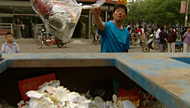Climate-friendly waste management in China
On 22 September 2011, following two years of construction work overseen by both German and Chinese chemical engineers, a new mechanical biological waste treatment (MBT) plant was officially opened in the Chinese city of Gaobeidian.
On 22 September 2011, a new mechanical biological waste treatment (MBT) plant was officially opened in the Chinese city of Gaobeidian, following two years of construction work. German and Chinese chemical engineers worked together to erect the facility, located in Hebai Province just south of Beijing. The International Climate Initiative (ICI) provided EUR 3.2 million in funding for the project, which was implemented by AWN Umwelt GmbH, a public subsidiary company of the Neckar-Odenwald district in the German state of Baden-Württemburg. The plant is intended to pioneer climate-compatible waste management in the region.
The Chinese Government was represented at the opening ceremony by the country's Ministry of Commerce, while Dr Andre Radde attended on behalf of the German Federal Ministry for the Environment, Nature Conservation and Nuclear Safety (BMU). Addressing those gathered, Gaobeidian's Mayor Han and the Chief Administrator of the Neckar-Odenwald district Dr Achim Brötel both emphasised the importance of intensifying German-Chinese cooperation and focussing future efforts on the priority areas of energy efficiency and renewable energy sources.
In future, the newly launched plant will sort the mixed household waste of Gaobeidian's 250,000 inhabitants and treat the separated substances in downstream processes that minimise environmental and climate impact. The facility can handle a total of 40,000 tonnes of waste a year. Incoming waste is first routed through a trommel, which separates the waste into three streams. Recyclables such as paper, plastic and metals are then manually recovered at a picking station. The remaining, primarily organic substances are then further treated and reduced by micro-organisms in an anaerobic breakdown process. The resultant soil-like products have agricultural uses, and only a small fraction of residual waste is sent to landfill. Handling and treating waste in this way generates few emissions, minimising the formation of methane gas, which is harmful to the climate. Over its planned 20-year service life, the plant could reduce emissions by a carbon dioxide equivalent (CDE) of some half a million tonnes.
AWN Umwelt GmbH will operate the facility for the first year to bring the MBT plant up to full operation, after which a municipally-owned firm in Gaobeidian will take over.
The link has been copied to the clipboard
Contact
IKI Office
Zukunft – Umwelt – Gesellschaft (ZUG) gGmbH
Stresemannstraße 69-71
10963 Berlin




